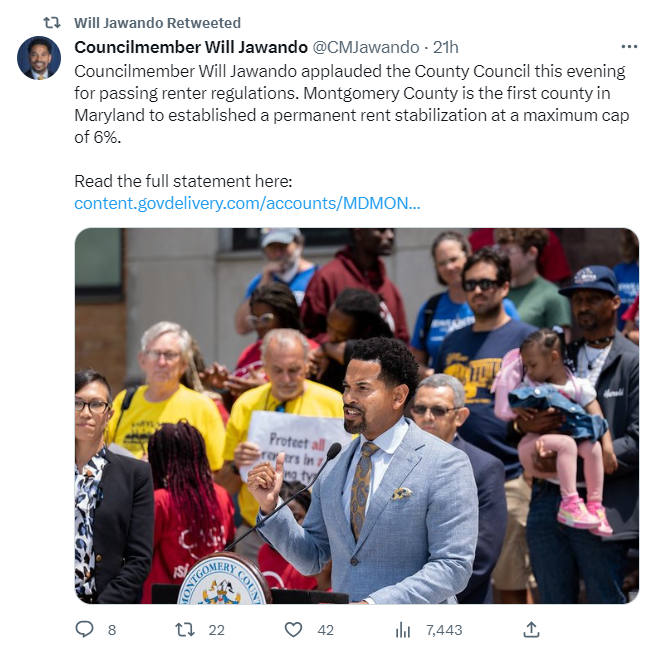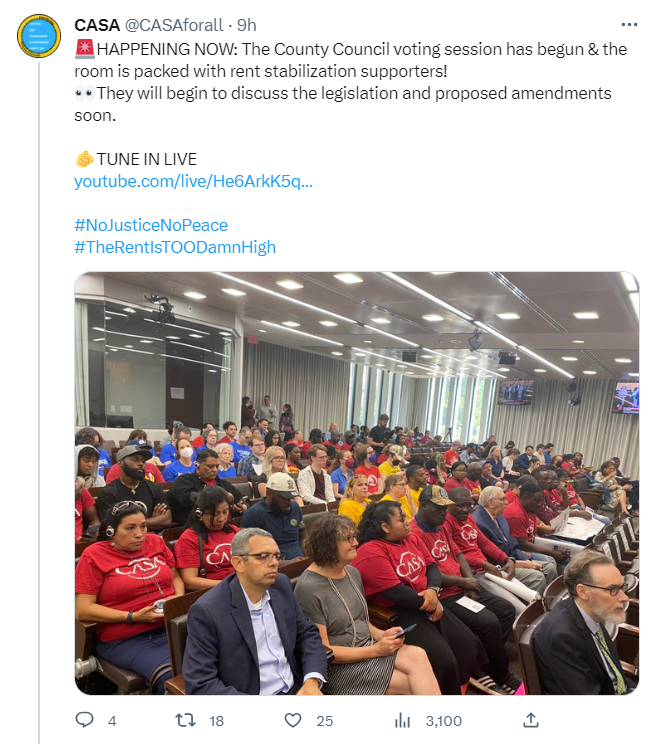By Adam Pagnucco.
The battle for rent control was a historic event in Montgomery County. And like all big battles, it had winners and losers. Here is a list.
Winners
Council Member Will Jawando
Jawando will go down as the father of rent control in Montgomery County. He has always been a talented politician but now he has a legacy affecting hundreds of thousands of tenants. In his future campaigns, he will be sure to remind progressives of his titanic achievement. He may not be a U.S. Senator next year, but if he runs for a more reachable office (U.S. House, county executive), his rent control law will be a huge asset for clearing his lane on the left.

County Executive Marc Elrich
Elrich has dreamed of passing countywide rent control for decades. When he was at the council, he never introduced a rent control bill because he did not have the votes. When the votes were in reach, Elrich played an important supporting role in securing victory. In particular, his veto threat helped make passage of a weak bill impossible.
Council Member Kristin Mink
Back in January, I wrote that Mink should never be underestimated. Yes, she may have haters, but she has had an impact. Her first bill resulted in a large increase in recordation taxes. On rent control, she was an unshakable vote not only for the overall concept but for every progressive amendment. If Jawando is the current leader of county progressives, Mink will succeed him when he leaves for a grander stage.
CASA
The Renters Alliance may have been the voice for rent control but CASA supplied the muscle. Look at any picture of a council meeting or rally on that issue and you will see tons of folks in red CASA shirts. CASA has never been more powerful and they are sure to spread rent control bills to other jurisdictions throughout Maryland and beyond.

Affordable Housing Providers
As for-profit private developers abandon projects in MoCo, affordable housing providers may be able to scoop up good opportunities at bargain prices. And unlike the for-profit sector, the affordable providers may have access to capital that does not object to rent control because they already finance income-limited projects. That said, the affordable housing sector does not have anywhere near the capacity needed to fully replace the for-profit housing industry.
Lawyers
The rent control law is incredibly complicated, leading to many billable hours for attorneys. Runner-up: bureaucrats, because many of them must be hired to administer the new law.
Condo Conversion Contractors
Business will be brisk in MoCo over the next few years!
Virginia
Every time MoCo passes disastrous economic and fiscal policies, Virginia wins. And right now, the Commonwealth is on a hot streak. Do they even regard us as a competitor anymore?
Losers
Council Member Natali Fani-Gonzalez
Fani-Gonzalez has damaged so many important relationships. Progressives lost trust in her when she signed onto the weak rent control bill. The business community lost trust in her when she flipped towards a strong bill. (Check out how fiercely the realtors blasted her and term-limited Council Member Sidney Katz). Worst of all, her council colleagues don’t trust her to stand fast against pressure. This is the worst of all worlds and it will be hard for her to recover.
Business Community
For the 8700th time, the business community showed it cannot be relied on as an ally. While progressives sent waves of bodies, biz folks sent a few letters – and sometimes not even that. They mounted no organized campaign against rent control, giving Fani-Gonzalez and Katz every reason to flip. If I had to share a foxhole with either CASA or these people, I would pick CASA every single time.
The Gang of Four
If Jawando, Mink and Laurie-Anne Sayles are “the squad,” then Andrew Friedson, Gabe Albornoz, Marilyn Balcombe and Dawn Luedtke are “the gang of four.” They made the fatal mistake of trusting Fani-Gonzalez and Katz to stick with them on the weak bill and then lost many amendment votes at full council. And because they had co-sponsored a rent control bill, even a weak one, they lost the ability to argue that rent control as a concept is inherently flawed.
Their predicament isn’t entirely their fault because the business community gives them little backup, thereby making it hard to reach a majority on issues pitting the far left against the center left. Right now, the Jawando-Mink axis is exerting more gravitational force on the council’s direction because of the imbalance between progressive militancy and business apathy. We shall see how long that lasts.
Residential Taxpayers
In a previous post, I explained how rent control would prompt a wave of apartment building assessment appeals. One developer openly discussed receiving pitches from appeal consultants. As commercial building values drop, homeowners will be left holding the bag the next time the council raises property taxes – which could happen as soon as next year.
Municipal Elected Officials
The county’s rent control law does not automatically apply in municipalities, so their mayors and council members will now face pressure to opt in or pass their own ordinances. Many do not want to deal with this headache but they may have no choice.
Push
Tenants
The extensive economic literature on rent control makes clear that these laws create winners and losers among tenants. Tenants who are lucky enough to find and remain in controlled units benefit from low rents even if they come at the cost of maintenance problems. But other tenants struggle to find housing (as has happened in Takoma Park) and can actually face higher rents in non-controlled units because of constricted housing supply. Rent control laws make for great propaganda by politicians but their consequences on the ground are more complicated.
Developers
Large owners of existing multifamily buildings face some choices. Will they convert them to condos, sell them (probably at a discount), redevelop them or milk them for whatever meager cash can be extracted? They are probably running the numbers as you read this. But in the long run, as developer Peter Henry stated, they will simply shift their money to other jurisdictions. That means Virginia, Howard County, Texas, the Carolinas and other places will get the investment, housing and tax dollars that should be ours. Unlike our county, the developers will do OK in the end.
